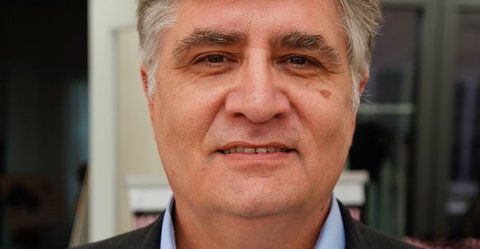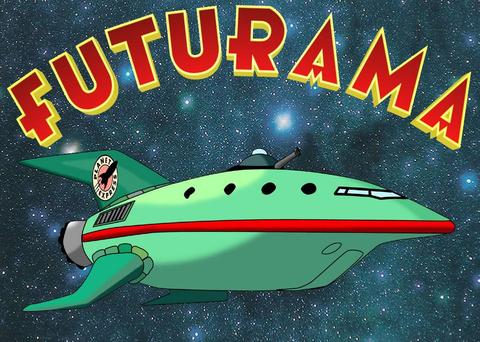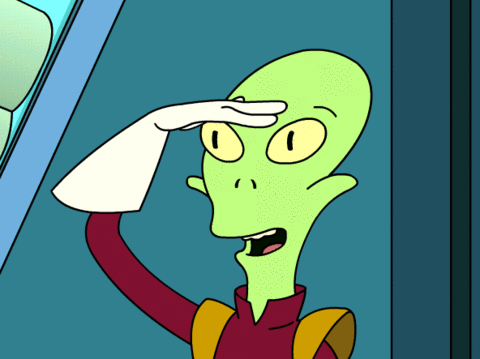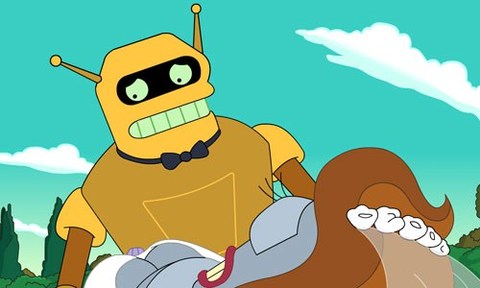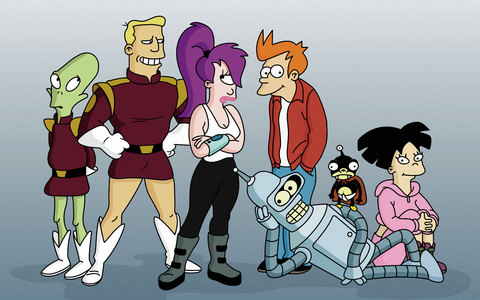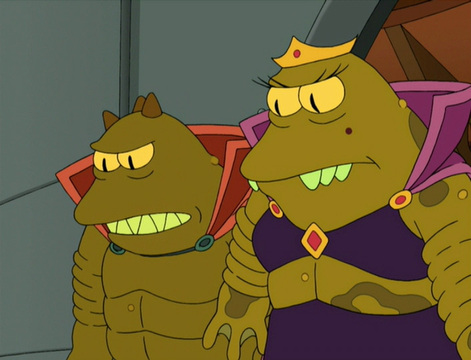The Light from the TV Shows: A Chat with Maurice LaMarche (“Futurama”)
Maurice LaMarche has been my Facebook friend for several years, but I’d never actually met him, talked to him, or even traded email with him until a few days ago…which means, of course, that he really wasn’t my friend at all. I mean, not really, anyway. After I found out that he and I would be chatting in conjunction with the return of “Futurama,” however, I decided I’d tag him on my status update about our upcoming conversation. In turn, I drew Mr. LaMarche’s attention at long last…or, at least, one of my “likes” did.
Eh. Either way, Maurice LaMarche kinda sorta knew who I was when I got on the phone. I’m chalking it up as a win.
Maurice LaMarche: Now, I’m looking here on your Facebook page, and…who are your likes? Because I see you’ve got “The Newsroom,” and then you’ve got this guy with really tightly cropped hair, but then when I go into your page, you’ve got something like 1,200 “likes,” so I can’t tell who he is. Do you know who I’m talking about?
Bullz-Eye: Yeah, he’s…I’m blanking on his name right this second, but he’s part of the cast of USA’s “Suits.”
MLM: Hmmm. Because he looks like a guy who used to be on a show that I loved that got cancelled, a show called “Jake In Progress.” He played a magician, I think, but…God, that’s gonna drive me nuts now. I’ve got to look up “Suits” now! [Laughs.] Sorry! Then we can start. I’m a little compulsive…
BE: Well, look, I’ll help you out: that’s the same guy. His name is Rick Hoffman.
MLM: Yes! I love him! He’s so good. So funny. I love that guy.
BE: Yeah, I think I first saw him on “Samantha Who?”
MLM: Okay, so you never saw him on “Jake in Progress,” then…? Oh, “Jake in Progress” was my favorite show, and it just was treated so… [Puffs up his voice.] …ignominiously by ABC. Reminiscent of the way they treated a certain futuristic cartoon show, one might say.
BE: I’m sure I don’t know what you’re referring to.
MLM: I’m sure I don’t, either. [Laughs, then puffs up voice again.] But Comedy Central has treated us much better.
BE: Yes, “Futurama” continues to be the gift that keeps on giving. It’s like a zombie: Fox tried to kill it, but they couldn’t get rid of it.
MLM: That’s right. We just keep coming back at you. And we’ll try not to do any zombie storylines, so…thank you for your patronage. [Laughs.]
BE: So when you first came into the mix for “Futurama” way back when, was it as an all-purpose player, or did they envision you for a particular part from the beginning?
MLM: No, I was really supposed to be the utility voice guy. Billy (West) was actually supposed to be that. They had a different Fry in an unaired pilot, and they just felt both the Fry and Leela they had hired weren’t working. So they got Katey (Sagal), and they thought, “Well, Billy’s default voice, if he just talked a little higher, would be good for Fry.” So with him being all through the show, not only as the Professor and Zoidberg, which were parts that he already had, but as Fry, they just felt that they needed another guy, because maybe Billy’s superpowers might be stretched a little thin. [Laughs.] So I came onboard in Episode 2, and…I had done a good audition, but when I heard they went ahead with the pilot, I kind of shrugged and just went, “Okay, I guess I didn’t get this one.” And so when I came onboard in Episode 2, they said, “Okay, so you’re the utility voice guy, and just do everything we tell you. Just be there and be ready to create a whole mess of characters.” So I was just ready to be that guy.
But then round about the fourth episode or so, along came this character, Kif, that Matt (Groening) seemed to have a particular interest in. He came to the session and just directed me and really wanted this dynamic between Zapp (Brannigan) and Kif to really work, to really be kind of another story in the show. Kind of a duo: the bumbling blowhard who doesn’t know he’s a blowhard, and the meek little guy who probably knows more but can’t do anything about it. An impotent little fellow. So it was good. He told me he wanted something that had some of the arrogance of Jon Lovitz… [Laughs.] You know, when Lovitz gets a little pissy. But, y’know, something that also sounded weaker. I thought, “Weaker than Jon Lovitz? You want a weaker voice than Jon Lovitz…?” So I folded in that Truman Capote little flavor, and that’s where Kif came from.
BE: So what does it say in the script when Kif offers up his shuddering sigh?
MLM: Actually, this is nice – it’s actually become a trademark – but it actually just says, “Kif sigh.” It says Kif’s name, and then underneath it’ll say “Kif sigh.” So I know that’s when it’s time to do the patented Kif sigh. [Laughs.] At one point, in the initial scripts, it said something like “sigh of resignation,” and I just…I knew that sound, because I’d been married, so I just went… [Offers a Kif sigh.] And for some reason, they really just clung onto that and the way I sighed, because that became a trademark. They’d actually say, “I just love the way you sigh. It just sounds so…downtrodden.” [Laughs.] So it became a thing. The sigh became a thing.
BE: One of your other regular contributions to the show is the voice of Calculon, which I admit is one of my personal favorites.
MLM: [Launches into his Calculon voice.] I thank you. You know, normally I’m programmed to be very, very busy, Will, but today I’ve made time for you. Anybody who would post on their Facebook that they’re interviewing me, Calculon, and my alter-ego, Maurice LaMarche, deserves my time.
BE: [Laughs.] That’s very kind of you. I should also add that my daughter has become an equally obsessive “Futurama” fan.
MLM: Nice.
BE: Although I have to admit that, when we sat down to watch the season premiere together, I…well, actually, I tagged John DiMaggio on this status update, but the questions about how Bender managed to impregnate the soda machine, I deferred to him.
MLM: [Laughs.] I think you must. Oh, but as far as Calculon goes, he’s a favorite of mine, too. And I say that at the risk of sounding like Calculon. But as far as the stable I’ve gotten to build up over the years on “Futurama,” he’s the most fun, because he’s got all this bombastic, but he’s…unlike Zapp, he’s harmless. He doesn’t command a space fleet with laser beams that can slice planets in half. He’s just an actor. So, you know, we can laugh at the huge ego and realize that the worst he can do is yell at a production assistant. [Laughs.] That’s the most harm he can do. So I have a lot of fun with him, and this season…I think it’s the first half of Season 7. Or Season 7A, as we’re now calling it. I think it’s in Season 7A, as opposed to 7B, in which he faces his greatest acting challenge ever. So we’re gonna have fun with that.
BE: Yes, as soon as I told my daughter I was talking to you and tried to clarify which characters you play, I described Calculon, and she hesitated for a second, but then she asked, “Is he the one who made the movie with Zoidberg’s uncle?”
MLM: [Laughs.] “If I don’t win this Oscar, you’re cat food!”
BE: One of the greatest things about “Futurama” is that it has the ability to be incredibly dumb and smart at the same time, I guess is the best way to phrase it.
MLM: Just like Fry. I mean, that’s…the dichotomy of Fry. The why of Fry, which they explored in the episode “The Why of Fry,” is part of the appeal. He’s this incredibly dumbed-down character who occasionally says incredibly insightful things or figures out exactly the right thing to do. And, y’know, it’s apparently to do with being his own grandfather…which I hope you haven’t had to explain to your daughter yet, but…
BE: Actually, we watched the episode the other night, and I basically shrugged it off by saying, “Let’s just say that this could only happen because of time travel and move on.”
MLM: [Laughs.] There you go. So, yeah, we’ve got some of the smartest writers in the business. We’ve got PhDs on our writing staff, MAs, MSCs…half the writing staff is Harvard-educated science geeks, and the other half are from a stable of real seasoned sitcom writers or have written for stand-up comics. And those two coming together…you’ve really got something funny. So it’s great.
BE: The standard reply is that they’re all like your children, I know, but are there any particular episodes that really stand out for you as favorites?
MLM: Hmmm. Over the course of the entire series, or just this upcoming season?
BE: I guess over the course of the entire series, since it gives you more to work with.
MLM: Well, I’ll tell you, my standard line has become, “How can you not love an episode that won you an Emmy?” So “Lrrreconcilable Differences” really stands out, first of all because I had no idea going in that day that it was going to be anything other than a lot of fun and that I was going to meet Katey Sackhoff. But it ended up being a really hilarious script, and then seeing it animated and showing it at Comic-Con…the first time anyone ever laid eyes on it was at Comic-Con, and here the very first shot was this perfect rendering of the San Diego Convention Center in the year 3010. Well, perfect except it’s future-y, so things are floating where they shouldn’t be able to float, because of all the anti-gravity devices. [Laughs.] But there are so many little things, like when he tromps down that ramp and takes the microphone and it’s not close enough. I mean, how many times has that happened at Comic-Con, you know? You’ve seen it. There are so many nice moments in there.
Lrrr is like Kif. Kif, Calculon, and Lrrr are my favorites, in terms of my stable of characters. Lrrr is so…he’s just so messed up. [Laughs.] He’s supposed to be this ruler of planet Omicron Persei VIII, and yet he gets nothing right in his personal life. And I think a lot of people can relate to that. They have a professional face that makes it seem as though they’ve got it all together, and then they get it home and their face hit them in the face with a skillet. [Laughs.] Or yells at them for never taking them anywhere. He’s impotent, you know? He’s facing all these things that certainly the older segment of our audience can relate to. This season, we’ve got…again, I don’t know if it’s 7A or 7B, but there’s a nice Lrrr episode where we explore his relationship with his teenage son, which is exactly where I am in life. I’ve got a teenage son, and sometimes we connect and sometimes we’re on completely different levels. So that one’s a favorite script coming up.
You know, just a comment on the writing, it’s always smart, but I’d have to say that in the first couple of seasons, the shows weren’t…they were a little snarkier and not terribly deep, at least to my mind. I don’t mean this as a slight on the writers. But as all of us have gone on in life…there’s a core group that’s stayed with the show…the show’s developed a real heart and a real moral center, and I just think the shows keep getting better and better. I’m sure David (X.) Cohen could talk to you more about that, but…you know, there are just different ways that we love our fellows, and we can explore those things by taking them to other places, other planets, other times. But at the core of at all, the message of “Futurama” is that technology may change, the face of the world may change, but people are still flawed. I think that, although they have these eccentricities, these foibles, whatever travails they may go through, that’s what the message will always be. But I feel like it’s sometimes even more effective to tell those stories the way we tell them, in that science-fiction-y way.
BE: I wanted to ask you about a couple of non-“Futurama” things as well. I’ve always been curious: I know that you did the voice of Orson Welles for that scene in “Ed Wood,” but what did Vincent D’Onofrio think of the fact that they had you do that?
MLM: Um…I don’ t know. I’ve never, ever met the man. The word through the grapevine was that he wasn’t terribly pleased at having his voice replaced. I don’t think he has anything against me. I don’t even think he knows I exist. But it spurred him to actually do his own Orson Welles short, which can be found on YouTube. It’s called “Five Minutes, Mr. Welles,” it’s a 30-minute long short where he reprises the role of Welles, and he does an excellent job of it. He actually does try to make the voice right in this one. When he did “Ed Wood,” and I’m one of the handful of people who saw the dailies, ‘cause they sent them to me so I could learn the timing, he chose to do this kind of high-pitched, reedy read. And it was kind of… [Imitates voice.] “How do you do? I’m Orson Welles.” And it almost sounded effeminate. And it was just wrong coming out of that perfect face, the way they’d lit him, the way he…he got down the way Welles pursed his lips before and after taking a puff on his cigar! I mean, it was just…he had every physicality down. And then there was this jarring departure where he did this [Imitates voice again.] “How do you do? Follow your dreams, Ed!” So Burton being, of course, an animator as his background, he still kept his eyes on all things animation and was aware of “Pinky & The Brain,” and just said… [Bellowing.] “Get me the guy that does The Brain!” Oh, yeah, and he sounded like he was in a ‘30s madcap comedy about a newsroom, obviously. [Laughs.] But that was the feeler that went out, and when he found out it was me, they put me on a plane to San Francisco, and I recorded it up there with him in the room.
BE: What are your recollections of working with Rodney Dangerfield and Sam Kinison when you were doing “The 9th Annual Young Comedians Special” for HBO?
MLM: [Hesitates.] Well…okay, first of all, no one’s ever been as supportive or kinder to me than Rodney Dangerfield. That said, I don’t know if you’ve heard the podcast where I told the real story of how Sam Kinison got on the Young Comedians…
BE: I have not.
MLM: Oh, okay. Well… [Starts to laugh.] Basically, I talked Rodney into putting Sam on the show. Now, this is gonna come off all bitter, but the truth is the truth: in Rodney’s book, he tells the story as he had to talk Sam into going on the show, but if you read the conversation in the book, every line he gives himself is a line I said to him, and every line he gives to Sam, where Sam’s, like, “I don’t know if I’m ready, Rodney, I can’t cook in five minutes,” is actually what Rodney said to me. And I’m sitting there on the tour bus, coming back from a gig with him, ‘cause I used to be his opening act, saying, “I’m telling you, Rodney, he can cook in five minutes, he’s got a hugely hilarious opening bit…” So I actually…I didn’t twist his arm, but I got him to take another look. And ultimately the decision was his to put Sam on “The Young Comedians,” which was the most meteoric rise I’ve ever seen since Howie Mandel did the “Make Me Laugh” show.
Kinison was a friend for years. I knew Sam when he was managing the Weston Comedy Store and sleeping in the club, ‘cause he didn’t have money for an apartment. And I’d take him out for food. I was only nominally making a living, but I was doing better than him, so I’d take him to Art’s Delicatessen, and we’d eat and talk about, “Someday it won’t be like this…” And then, y’know, VOOM! “Hey, what was that whoosh?” “Oh, that’s Sam passing me on the fame-and-fortune superhighway.” [Laughs.] But it was great. I couldn’t have been happier for him. And, of course, I couldn’t have been more saddened by his death. Y’know, that’s…that to me was a huge tragedy. And I did try to help Sam to get sober. It was just…he managed to do so for about 88 days, and then I guess something about it being the same number as the number of keys on a piano…? He decided he already owned a keychain and didn’t want to get any more of those chips, and he started up again. But I loved him, he was a dear friend, and I remember him fondly. Every April 10th, I take a moment to think about him. That was the day he died, in 1992. Yeah, he was a dear friend. And an amazing talent. Changed the face of the game, as they say.
BE: Do you have a favorite project you’ve worked on over the years that didn’t get the love you thought it deserved? Excluding “Futurama,” I guess, since Fox obviously didn’t respect that quite as much as they should’ve.
MLM: Oh, we got our love, though. [Laughs.] And, listen, 20th Century Fox Television is incredibly supportive of the show. It’s the network that didn’t see its potential. But 20th Century TV and Gary and Dana have been champions of the show, along with Doug Herzog over at Comedy Central. So, yeah, we’ve definitely gotten the love. [Does Hedonism Bot voice.] It’s merely taken awhile for the cream of “Futurama” to rise to the top!
I’ll tell you a show that I thought, “Wow, that really should’ve gone longer,” which was a show I did back in the early ‘90s called “Taz-Mania.” That was sort of the brainchild of Art Vitello, the idea of taking Taz – a three-shot character, really, when all was said and done with the classic Looney Tunes – and giving him a home life, showing that he has this sort of Bing Crosby dad… [Adopts Bing Crosby voice.] “Well, what are you doing there, son? Blah, blah, blah, yakity smakity. That’s a dog…? Well, he’s got stinky breath, that’s normal for a dog, but it looks like a turtle!” So I got to play the dad, and we even brought in an uncle character who sounded like Bob Hope. And I did an entire episode as Hope and Crosby doing this “Road” picture where basically the whole script was me, except for, like, five lines. [Laughs.] And it was really clever, and we had so much fun making the show. And it just kind of did nothing on television. I don’t know why it never garnered a following. I think it was sandwiched between “Steven Spielberg Presents Tiny Toons” and “Steven Spielberg Presents Animaniacs,” and “Steven Spielberg Presents Pinky & The Brain.” All shows that I had the extreme pleasure of working on, but…right in the middle was this thing that was just, y’know, “Warner Brothers Presents Taz-Mania.” It had no “Steven Spielberg Presents.” So I don’t know if they didn’t push it hard enough or it didn’t have that Spielbergian flavor, but…I always felt it never got its due. I thought it was a great show.
BE: Over the course of your career, you’ve stepped into roles that were obviously established by other voice actors. Do you get intimidated by that, or do you just see it as a challenge?
MLM: Oh, no, no, it’s very intimidating. I mean, when I had the temerity to read for Popeye back in the 1980s, I just thought, “How do you step into this iconic role?” I’d been watching it since I was a little kid, y’know? Jack Mercer was Popeye for 52 years. There was a guy named Red Pepper Sam – Bill Costello was his name, Red Pepper Sam was his stage name – and he…oh, God, Billy West knows this. He’s much more of a cartoon historian than I am, and Tom Kenny is even more of one than Billy West. I’m pretty bad at this stuff. But…I think he only did a handful of episodes, but he was the established voice of Popeye, and then he left for some reason. I can’t remember if it was for the war effort or for more money, but Mercer stepped in. He was an animator, but when he pitched a story, he did the voice pretty damned good, so they got him in there, and he was the voice for 52 years. And I just thought, “How am I supposed to take over for this guy that passed away? They created the show ‘Popeye and Son’ for him!” So when I got it…I thought for sure somebody else would get it…I was stunned. And I think I was intimidated all through that, thinking…I had that voice in my head, saying, “Who are you, thinking you can play an icon like Popeye?” And you know what? It only lasted a season. [Laughs.] So maybe I sucked at the damned thing! Or it could’ve been the fact that Olive Oyl wore legwarmers and an aerobics outfit. [Laughs.] Hey, it was the ‘80s…
BE: Lastly, I saw on Wikipedia that, during your stand-up days, you actually served as the opening act for people like Donna Summer and David Sanborn. First of all, this immediately reminded me of Albert Brooks’ routine about opening for Richie Havens, but I was just wondering what your experiences were like as a stand-up opening for a musical act.
MLM: Well, first of all, I wish I knew the Richie Havens bit. I love Albert Brooks! [Laughs.] But I really only had great experiences opening for people. I never had a negative one. Donna Summer was lovely to me, God rest her soul. She had me to her dressing room to say “hello” and “thanks for the great job” about midway through my time with her. Sanborn was great. First of all, he was a jazz hero of mine, so…he actually took me on tour with him. I only did a few dates with Donna in Atlantic City, but David took me on tour with him. And when we were off-tour, he called me at my house just to see how I was doing. It was great. And I remember going backstage for another concert…it was Al Jarreau…and David was there, and he came up and just gave me the hugest hug. It impressed the hell out of my date. [Laughs.] It was great.
I’ve really only had great experiences. (George) Carlin was great. A nice, nice guy. But Rodney really, of all of them, was the most generous. I’ll never forget a time where we pulled into Latham, New York, and my name was not on the billboard. He always insisted that I get 50% billing. In Las Vegas, you have to fight for 25% billing, but here I was generously being given 50% letters. My letters were half as tall as his. I have a picture with my father standing in front of my billboard. He couldn’t have been prouder. But we pulled up to Latham and my name wasn’t on the billboard, and he refused to go on until someone got on a cherry picker. [Laughs.] And the billboard was up on one of these Jetsons-like poles that just shot up as far as you could go, so the guy got up there and did it. Rodney’s road manager pulled me out there and said, “Take a look at this,” and, sure enough, there as this guy risking his life to put “Maurice LeMarche” on there. I said, “Ah, I wish he hadn’t done that. It’s okay.” He said, “Hey, Rodney knows what it’s like to work shit joints all of his career. He’s not going on ‘til you get what he asked for, because he doesn’t want it to be so tough for you.” So, y’know, those were my opening-act experiences. I look back it as a very fond time in my life.
BE: And clearly things have gone well for you in the voice acting business as well.
MLM: Yes, that is true. [Laughs.] I do miss stand-up, but I’ve found this wonderful second career in voiceover, and, y’know, it’s been a wonderful ride. And I hope it keeps going on.
Related Posts
Comments Off on The Light from the TV Shows: A Chat with Maurice LaMarche (“Futurama”)
Posted in: Entertainment, Interviews, Movies, News, Television
Tags: Billy West, Calculon, Comedy Central, David Sanborn, Donna Summer, Ed Wood, Futurama, George Carlin, Hedonism Bot, John DiMaggio, Katey Sagal, Kif, Lrrr, Matt Groening, Maurice LaMarche, Pinky and the Brain, Rodney Dangerfield, Sam Kinison, Taz-Mania, The Light from the TV Shows, Vincent D'Onofrio, Will Harris


